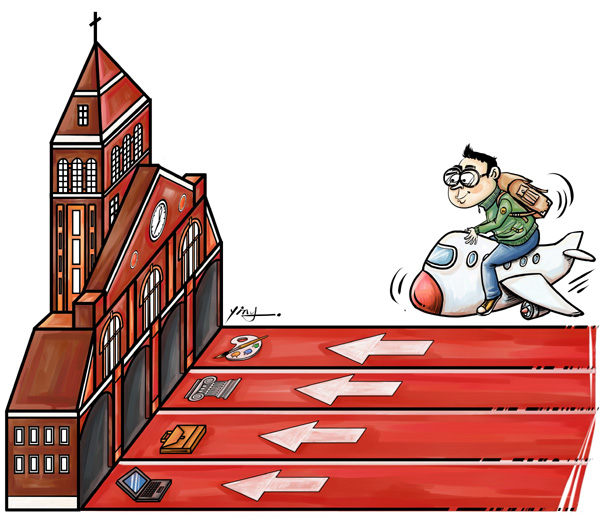 |
| Wang Xiaoying / China Daily |
The latest generation of young Chinese students heading overseas have a wealth of study options unimaginable to their predecessors, as Zhao Xinying and Zhang Yue report from Beijing.
|
Bringing it all back home The 23-year-old, who now lives and works in her hometown of Xi'an in Shaanxi province, said she chose the major just because of her curiosity about, and love of, France. "It's a romantic country that I wanted to visit and live in for a period of time. In addition, the French language, which is beautiful and interesting, also attracted me," she said. However, when she arrived in La Rochelle in the autumn of 2010, Yang discovered that studying there was not as easy or fantastic as she had imagined. "I only started learning the language a short time before I went to France, so when I first arrived there, I couldn't fully understand what the teachers and students were talking about. I wasn't able to take notes in class, either," she said. Fortunately, within six months, the language issue was no longer an obstacle, and Yang began to do well in her studies. However, she faced a much bigger problem in 2013, when she graduated and tried to land a job. "It's difficult for a graduate of humanities and social sciences to find a job in France, especially if you are an international student," she said. Eventually, Yang returned to her hometown harboring the belief that a graduate with experience of studying oversea would be competitive on the Chinese job market, an assumption that proved to be correct. Yang, who is now mulling several job offers, said she is grateful to have had the opportunity to study in France, because the experience widened her horizons. "My advantages in two languages - Chinese and French - have presented me with a couple of chances to be a translator or an interpreter here in Xi'an, which was precisely my goal when I started hunting for jobs after I returned from France," she said. -Zhao Xinying |
Pan, now 53, came from a science background; having originally studied for a bachelor's in aerospace technology in 1978, just a year after China resumed the gaokao, or national college entrance exam. He later moved on to postgraduate study at the Dalian Institute of Mechanics before traveling to New York to take up a full scholarship at the Stevens Institute of Technology.
By the time Pan arrived in the US, more than half of his 20 postgraduate classmates had already studied there, and in his five years in New York, almost all the Chinese students he knew were science majors.
"The only Chinese person I knew in New York who majored in a nonscience subject was Yang Lan, who was already famous in China as a TV anchor," Pan said.
Times change, however, and two decades later, Chinese students are making radically different choices in the majors they choose to study overseas.
According to the 2013 Open Doors Report on International Exchange Education, released by the Institute of International Education in November, 29 percent of Chinese students who studied in the US during the 2012-13 academic year chose to major in business and management, a course that has overtaken engineering, math and computer science to rank as the most popular in the list of top 10 majors for Chinese students at US universities.
Other nonscience majors, such as social sciences at 8.2 percent, fine and applied arts (4.9 percent) and intensive English (3.2 percent), also made the list, emphasizing the fact that Chinese students studying overseas are widening their academic horizons. Data related to the popularity of nonscience courses in countries such as the United Kingdom and Australia indicate a similar trend.
Zhang Qian, director of consultants at the US Education Department of EIC Group, a consultancy that helps Chinese students to study overseas, said the greater diversification in the choice of majors is a direct result of higher standards of living and an improvement in family circumstances across China.
Greater range of options
"Now, as incomes rise for an increasing number of Chinese families, parents can afford to send their children overseas to study. Also, fewer Chinese students are reliant on scholarships, most of which are awarded to those studying science-related majors. Chinese students now have a greater range of choices and don't have to worry so much about money," Zhang said, adding that majors such as sociology, East Asian Studies, teaching and law, which were seldom studied a few decades ago, have become increasingly popular.
Sun Siyi, a senior student at Pennsylvania State University in the US, said her parents are just about able to handle the cost of her education, including a tuition fee of $32,000 a year and annual living expenses of $20,000.
"My father works at a State-owned company on Financial Street in Beijing, and my mother has founded her own company. Although it's not that easy for them, they are still able to afford the cost of my education and are fully supportive of the decisions I have made," said the 20-year-old.
